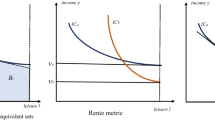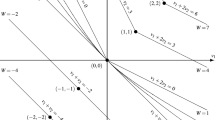Summary.
Different social planners may have different opinions on the well-being of individuals under different social options (Roberts, 1980). If utilities are translation- or ratio-scale measurable, or if the social ranking might be incomplete, or if interplanner comparability is allowed; then there exist non-dictatorial aggregation rules. We propose extensions, intersections, and mixtures of the Pareto, utilitarian, leximin, Kolm-Pollak, and iso-elastic rules.
Similar content being viewed by others
Author information
Authors and Affiliations
Corresponding author
Additional information
Received: 16 May 2001, Revised: 18 November 2003,
JEL Classification Numbers:
D63, D71.
Correspondence to: Erwin Ooghe
Erwin Ooghe, Luc Lauwers: We are extremely grateful to the referee who was willing to review this paper many times. Her/his ‘extensive’ and in-depth comments had a strong impact. Further thanks are due to Bart Capéau, Marc Fleurbaey, Maurice Salles, Erik Schokkaert, and Alain Trannoy. The first author gratefully acknowledges the financial support by the TMR network Living Standards, Inequality and Taxation (ERBFMRXCT 980248) of the European Communities.
Rights and permissions
About this article
Cite this article
Ooghe, E., Lauwers, L. Non-dictatorial extensive social choice. Economic Theory 25, 721–743 (2005). https://doi.org/10.1007/s00199-003-0452-6
Issue Date:
DOI: https://doi.org/10.1007/s00199-003-0452-6




